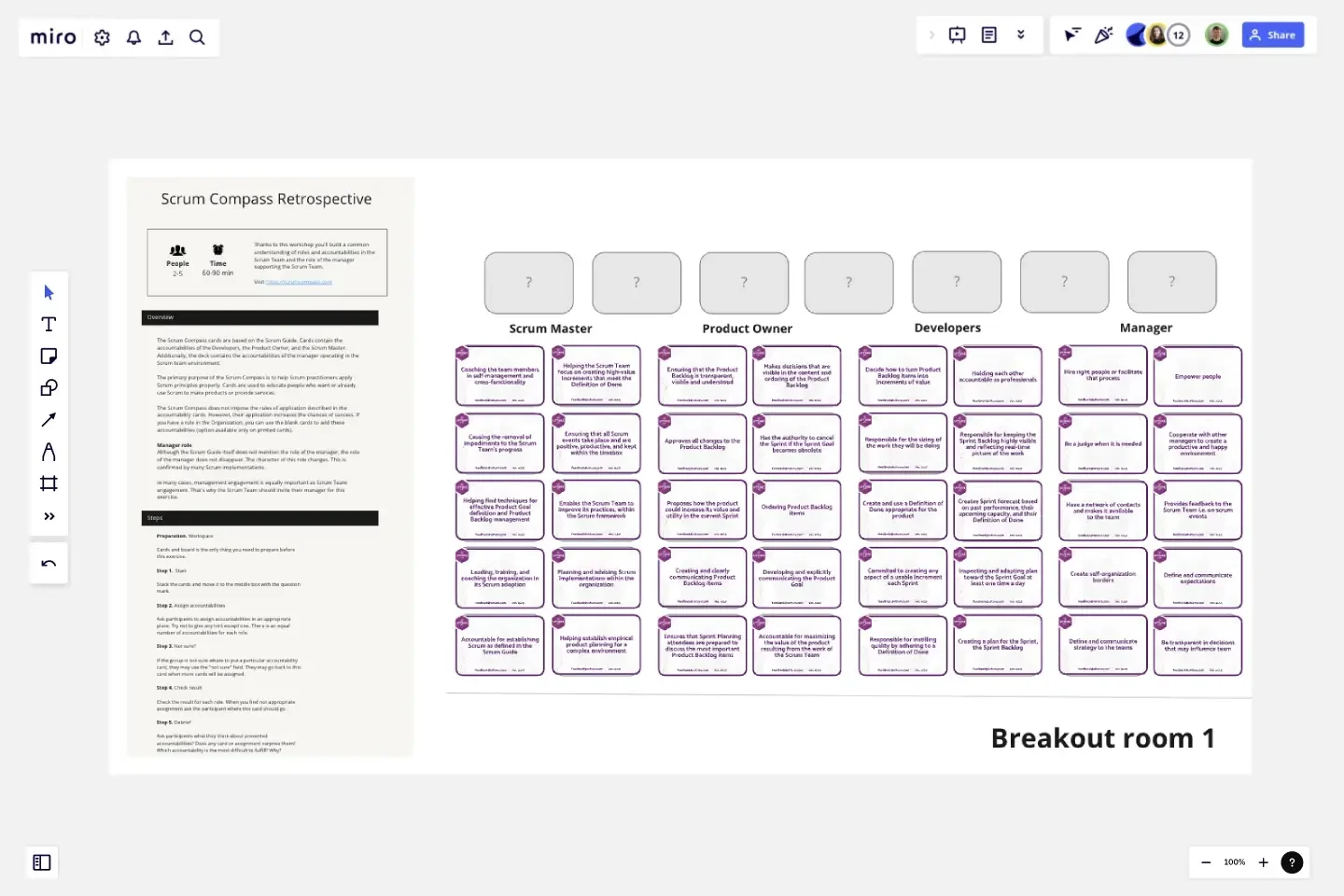Scrum Compass
The Scrum Compass cards are based on the Scrum Guide.
Cards contain the accountabilities of the Developers, the Product Owner, and the Scrum Master. Additionally, the deck contains the accountabilities of the manager operating in the Scrum team environment.
Although the Scrum Guide itself does not mention the role of the manager, the role of the manager does not disappear. The character of this role changes. This is confirmed by many Scrum implementations.
The primary purpose of the Scrum Compass is to help Scrum practitioners apply Scrum principles properly. Cards are used to educate people who want or already use Scrum to make products or provide services.
The Scrum Compass does not impose the rules of application described in the accountability cards. However, their application increases the chances of success. If you have a role in the Organization, you can use the blank cards to add these accountabilities (option available only on printed cards).
This template was created by Tomek Pawlak.
8 Different Ways to Organize Your Backlog
Works best for:
Agile
Explore 8 different techniques for managing and prioritizing work effectively with this template. From prioritization matrices to story mapping, it offers a comprehensive overview of backlog management strategies. By understanding the strengths and limitations of each approach, teams can tailor their backlog organization to optimize workflow, empowering teams to stay organized and focused on delivering value.
Midnight Sailboat Retrospective
Works best for:
Retrospectives, Meetings, Agile Methodology
The Midnight Sailboat Retrospective template offers a metaphorical journey through past experiences and future aspirations, likening the retrospective process to a midnight sailboat voyage. It provides elements for reflecting on challenges faced, lessons learned, and goals for the future. This template enables teams to navigate uncertainties, chart a course for success, and foster a culture of resilience. By promoting reflection and metaphorical thinking, the Midnight Sailboat Retrospective empowers teams to overcome obstacles, embrace change, and sail towards their goals effectively.
Scrum Puzzle
Works best for:
Agile
The Scrum Puzzle is a collaborative activity that reinforces Scrum roles, artifacts, and ceremonies. By assembling a puzzle representing the Scrum framework, teams gain a deeper understanding of its components and how they interrelate. This template offers a fun and interactive way to reinforce Scrum knowledge and promote team alignment, empowering practitioners to apply Scrum principles effectively and deliver value with agility.
Product Discovery Ideation Session
Works best for:
Agile
The Product Discovery Ideation Session template fosters creativity and innovation in product development. By providing a structured framework for brainstorming ideas, exploring user needs, and generating solutions, this template fuels ideation sessions. With sections for user persona development, problem validation, and idea prioritization, it guides teams through the product discovery process, ensuring that solutions are aligned with user needs and market opportunities. This template serves as a catalyst for generating and refining innovative product ideas.
FMEA Analysis Template
Works best for:
Agile Methodology, Strategic Planning, Software Development
When you’re building a business or running a team, risk comes with the territory. You can’t eliminate it. But you CAN identify it and mitigate it, to up your odds of success. Failure Modes and Effects Analysis (FMEA) is a powerful tool designed to help you manage risk and potential problems by spotting them within a process, product, or system. And you’ll spot them earlier in your process—to let you sidestep costly changes that arise late in the game or, worse, after they’ve impacted your customers and their experience.
Start, Stop, Continue Template
Works best for:
Retrospectives, Meetings, Workshops
Giving and receiving feedback can be challenging and intimidating. It’s hard to look back over a quarter or even a week and parse a set of decisions into “positive” and “negative.” The Start Stop Continue framework was created to make it easier to reflect on your team’s recent experiences. The Start Stop Continue template encourages teams to look at specific actions they should start doing, stop doing, and continue doing. Together, collaborators agree on the most important steps to be more productive and successful.
